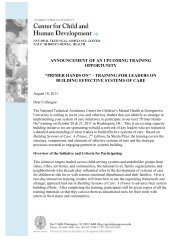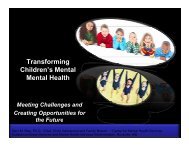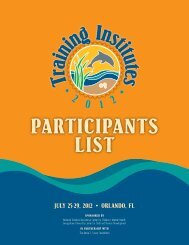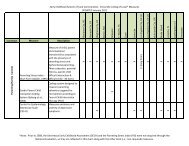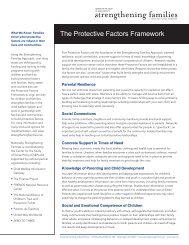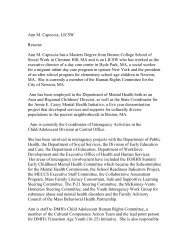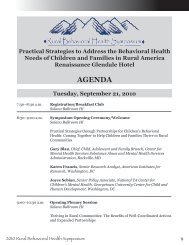Training Institutes 2012 - National Technical Assistance Center for ...
Training Institutes 2012 - National Technical Assistance Center for ...
Training Institutes 2012 - National Technical Assistance Center for ...
Create successful ePaper yourself
Turn your PDF publications into a flip-book with our unique Google optimized e-Paper software.
FLASH DRIVE MATERIALS<br />
• School-Based Mental Health: An Empirical Guide <strong>for</strong> Decision-Makers (K. Kutash, A.J. Duchnowski & N. Lynn, The<br />
Research and <strong>Training</strong> <strong>Center</strong> <strong>for</strong> Children’s Mental Health, Louis de la Parte Florida Mental Health Institute, University of<br />
South Florida, April 2006)<br />
• School Mental Health Sustainability: Funding Strategies to Build Sustainable School Mental Health Programs (E. Freeman,<br />
<strong>Technical</strong> <strong>Assistance</strong> Partnership <strong>for</strong> Child and Family Mental Health, Washington, DC, 2011).<br />
– Series 1: Why School Mental Health? What Is the Connection with Systems of Care<br />
– Series 2: What Are the Challenges to School and Mental Health Agency Partnerships?<br />
– Series 3: How Do Systems of Care Leaders Work with Community Agencies/ Organizations to Overcome Challenges to<br />
Develop a Sustainable School Mental Health Program?<br />
– Series 4: What Are Some Strategies to Sustain School Mental Health Programs?<br />
• School Mental Health Services in the United States, 2002-2003 (S. Foster, M. Rollefson, T. Doksum, D. Noonan, G. Robinson,<br />
& J. Teich, <strong>Center</strong> <strong>for</strong> Mental Health Services, Substance Abuse and Mental Health Services Administration, 2005)<br />
• School-Wide Positive Behavior Support: Implementers’ Blueprint and Self-Assessment (OSEP <strong>Center</strong> on Positive<br />
Behavioral Interventions and Supports, University of Oregon, 2004)<br />
• Systems of Care Work <strong>for</strong> Educators—Powerpoint Presentation (Caring <strong>for</strong> Every Child’s Mental Health Campaign, <strong>Center</strong><br />
<strong>for</strong> Mental Health Services within the Substance Abuse and Mental Health Services Administration, U.S. Department of<br />
Health and Human Services)<br />
• Talking Points on School-Wide Positive Behavior Support & School-Based Mental Health (Compiled by G. Sugai,<br />
Co-Director of the <strong>National</strong> <strong>Technical</strong> <strong>Assistance</strong> <strong>Center</strong> on PBIS, University of Connecticut; R. Horner, Co-Director<br />
of the <strong>National</strong> <strong>Technical</strong> <strong>Assistance</strong> <strong>Center</strong> on PBIS, University of Oregon; L. Eber, Statewide Director, Illinois PBIS<br />
Network, January 2007)<br />
• The Benefits of School-Based Social and Emotional Learning Programs: Highlights from a Forthcoming CASEL Report<br />
(Collaborative <strong>for</strong> Academic, Social, and Emotional Learning, December 2007)<br />
• The Role of Mental Health Services in Promoting Safe and Secure Schools (K. Kutash & A. Duchnowski, Hamilton Fish<br />
Institute on School and Community Violence and Northwest Regional Educational Library, 2008)<br />
• Way to Go—School Success <strong>for</strong> Children with Mental Health Care Needs [Monograph, Fact Sheets, and Checklists] (C.<br />
Koyanagi & E. Alsono, Bazelon <strong>Center</strong> <strong>for</strong> Mental Health Law, May 2006)<br />
• Website Links to Resources and Organizations <strong>for</strong> Mental Health Services in Schools (2008)<br />
• Working Together to Help Youth Thrive in Schools and Communities, Mental Health Awareness Day (<strong>Center</strong> <strong>for</strong> Mental<br />
Health Services, Substance Abuse and Mental Health Services Administration, U.S. Department of Health and Human<br />
Services, May 7, 2009)<br />
Partnering with the Child Welfare System<br />
• A Family’s Guide to the Child Welfare System (J. McCarthy, A. Marshall, J. Collins, G. Arganza, K. Deserly, & J. Milon,<br />
Georgetown University <strong>Center</strong> <strong>for</strong> Child and Human Development, <strong>Technical</strong> <strong>Assistance</strong> Partnership <strong>for</strong> Child and Family<br />
Mental Health, Child Welfare League of America, and <strong>National</strong> Indian Child Welfare Association, December 2003)<br />
• A Family Guide to the Indian Child Welfare Act (M. Hogan & D. Blanchard, 2009)<br />
• Benefits of Systems of Care <strong>for</strong> Child Welfare (<strong>Technical</strong> <strong>Assistance</strong> Partnership <strong>for</strong> Child and Family Health, Washington, DC)<br />
• Building Systems of Care: A Primer <strong>for</strong> Child Welfare is a companion document to the web-based training resource, Primer<br />
Hands On—Child Welfare [see below] (S. Pires, K. Lazear & L. Conlan, <strong>National</strong> <strong>Technical</strong> <strong>Assistance</strong> <strong>Center</strong> <strong>for</strong> Children’s<br />
Mental Health, Georgetown University <strong>Center</strong> <strong>for</strong> Child and Human Development, Washington, DC, Spring 2008)<br />
• Caring <strong>for</strong> Children Who Have Experienced Trauma: A Workshop <strong>for</strong> Resource Parents (<strong>National</strong> Child Traumatic Stress<br />
Network, 2010) Available at: http://www.nctsn.org/products/caring-<strong>for</strong>-children-who-have-experienced-trauma<br />
• Child Welfare/Education Collaborations: Highlights (<strong>National</strong> Resource <strong>Center</strong> <strong>for</strong> Permanency and Family<br />
Connections, 2010)<br />
• Child Welfare In<strong>for</strong>mation Gateway website: www.childwelfare.gov<br />
• Collaboration Between System of Care Communities and the Child Welfare System: Creative Ideas <strong>for</strong> How to Make it<br />
Work (J. Collins & A. Marshall, July 2006)<br />
• Community Partnerships: Improving the Response to Child Maltreatment (Children’s Bureau, Office on Child Abuse and<br />
Neglect, 2010)<br />
• Congressional Testimony of Commissioner Bryan Samuels on Psychotropic Medication Use <strong>for</strong> Children in Foster Care (<br />
Be<strong>for</strong>e the Subcommittee on Federal Financial Management, Government In<strong>for</strong>mation, Federal Services, and International<br />
Security, Senate Committee on Homeland Security and Governmental Affairs, United States Senate, December 1, 2011)<br />
• Congressional Testimony of Commissioner Bryan Samuels on Reauthorization of Promoting Safe and Stable Families (Be<strong>for</strong>e<br />
the Subcommittee on Human Resources, Committee on Ways and Means, U.S. House of Representatives, June 16, 2011)<br />
• Creating Child Welfare and Behavioral Health Partnerships (The <strong>National</strong> Council <strong>for</strong> Community Behavioral Healthcare, 2008)<br />
154 <strong>Training</strong> <strong>Institutes</strong> <strong>2012</strong>



